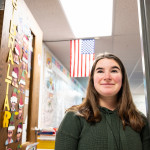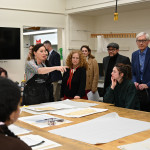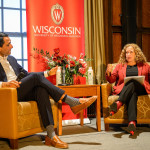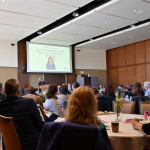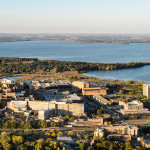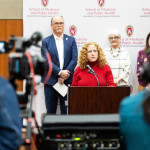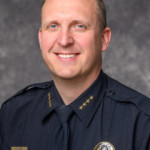Campus news Latest News
The comeback champs: Badger women’s hockey caps historic season with epic overtime win
The Wisconsin women’s hockey team captured another NCAA title on Sunday, March 23 with a thrilling overtime victory. The win is the Badger's eighth national championship, the most of any program in the country. Read More
Sun spot: Badgers enjoy a taste of early spring
Badgers flock to the Terrace during an unexpectedly warm day, just in time for this year's spring break recess. Read More
Bucky’s Tuition Promise makes college dreams come true for Wisconsin families
UW–Madison now has three major financial aid initiatives that support Wisconsin residents: Bucky’s Tuition Promise, Bucky’s Pell Pathway and The Wisconsin Tribal Educational Promise Program. Together, these initiatives have benefitted more than 8,000 students from Wisconsin over the past seven years. Read More
UW Curling Club sweeps to 2nd straight championship
The UW curling club, started as a club sport just two years ago, defeated perennial curling power Michigan Tech 5-3 in the championship in Midland, Mich., on March 9. Read More
A green sanctuary
Early spring holds the promise of green, as leaves and shoots will emerge in the coming months. But if you want to see and smell green foliage sooner, you can turn to the D.C. Smith Greenhouse, used to grow plants for classes in UW–Madison's College of Agricultural and Life Sciences. Read More
Meet the 2025 Distinguished Teaching Award winners
“These 12 talented educators come from academic disciplines that are as different as can be — from forestry to literature to computer science — but they share a deep commitment to inspiring our students to be curious about both ideas and the vast world around them, and to preparing them to lead lives of purpose in the proud tradition of the Wisconsin Idea," Chancellor Jennifer Mnookin says. Read More
For the love of a pet
The WisCARES veterinary clinic at UW–Madison provides affordable care for animal owners experiencing financial hardship or housing instability. Read More
AI, data science and the transformation of scientific research: A primer
The pace of technological advancement in AI and data science can be overwhelming. Here are 10 things to know about the two closely related yet distinct fields that are driving research and innovation in one of Wisconsin's key industries: agriculture. Read More
Remembering Professor Emerit Ann Palmenberg, renowned leader in virology
Enthusiastic, jovial and persistent, Palmenberg rarely did anything halfway, at work or at home. She made it her mission to find ways to connect with everyone she met — and if that meant an opportunity to share the coolest thing she did in the lab that week, all the better. Read More
Partners in Giving raises nearly $2 million for charities, recognizes volunteers
The campaign allows employees to make donations to the charity or charities of their choice, supporting causes that make a tremendous impact on the quality of life in their own neighborhoods, as well as abroad. Read More
UW-Madison update on Title VI complaint
UW–Madison condemns antisemitism in all its forms and strives to promote a welcoming campus environment for all members of the campus community, free from discrimination,… Read More
Brent Plisch named UWPD chief of police
Plisch said the UWPD will continue to focus on building relationships, learning about the UW–Madison community's expectations and finding creative ways to engage UWPD staff so the community is prepared to meet future challenges together. Read More
UW students embrace the many identities of the Black community during Black History Month
This year’s Black History Month theme celebrated the many vibrant and dynamic facets that make up Black identity. “Embracing Intersectionality: Celebrating the Rich Tapestry of Black Identity” honored the collective and individual experiences within the Black community. Read More



